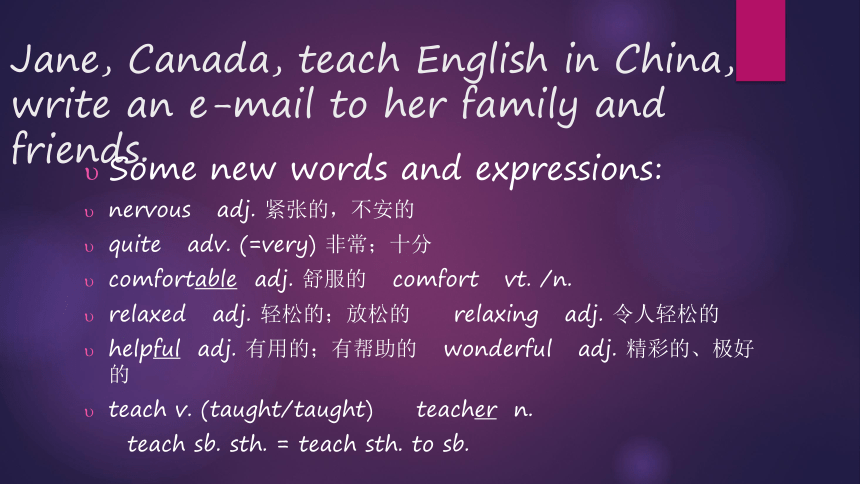Unit 3 School Life.Lesson 18 Teaching in China.课件
文档属性
| 名称 | Unit 3 School Life.Lesson 18 Teaching in China.课件 |

|
|
| 格式 | zip | ||
| 文件大小 | 4.9MB | ||
| 资源类型 | 教案 | ||
| 版本资源 | 冀教版 | ||
| 科目 | 英语 | ||
| 更新时间 | 2018-04-05 00:00:00 | ||
图片预览







文档简介
课件15张PPT。Lesson 18
Teaching in ChinaWebsites for jobs teaching in ChinaRequirements & Benefits of Teaching in ChinaTESOL-Teaching English to Speakers of Other LanguagesTwo old friends of mine --- Emmanuel (India) & Amanda (Canada)friendlynicecomfortablerelaxedhelpfulwonderfulJane, Canada, teach English in China, write an e-mail to her family and friends. Some new words and expressions:
nervous adj. 紧张的,不安的
quite adv. (=very) 非常;十分
comfortable adj. 舒服的 comfort vt. /n.
relaxed adj. 轻松的;放松的 relaxing adj. 令人轻松的
helpful adj. 有用的;有帮助的 wonderful adj. 精彩的、极好的
teach v. (taught/taught) teacher n.
teach sb. sth. = teach sth. to sb.Fill in the blanks with the words in the boxnervous friendly relaxed wonderful teach1. I didn’t know anyone at the party. But everyone was very ____________.friendly2. Spring is nice and warm. It is a ________________ season.wonderful3. Li Ming is going to give a talk. He is quite_________________.nervous4. I’m a teacher. I _______________ music at a middle school.teach5. After a busy day, I like to sit and drink a cup of tea. It makes me feel _______________.relaxedListen & write true (T) or false (F)1. Jane arrived in China last week.
2.Everyone is friendly and nice to Jane.
3. Canadian students don’t move to different
classrooms for their classes.
4. Jane’s students teach her about their culture.
(F)(T)(F)(T)Click hereThe differences between Chinese and Canadian Schools Schools in ChinaSchools in China1School is big.
Many students (always more than 50) in a class 2The teachers move from classroom to classroom for their classes38:00a.m.-5:00p.m.
Chinese students work very hard. Chinese teachers work very hard, too.Schools in CanadaSchools in Canada1School is not so big.
Usually only 35 students in a class2Students move from classroom to classroom for their classes3Class Hours:
8:00 am – 2:15 pm;
Office Hours:
7:30 am - 3:00 pm。Trump’s granddaughter
------ ArabellaThe Confucius InstitutionChinese Language Day We should learn Chinese and English well in order that one day we can also teach our mother language in other countries. Imagine that someday you become a foreign teacher teaching Chinese in Canada. You want to know more about your students. Work in groups. Interview your students and fill in the table with the adverbs given below. Example:
T: Do you do your homework?
S: Yes. I always do my homework.
T: Do you help out at home?
S: Yes. I sometimes wash the dishes.
T: Do you walk to school?
S: No. I never walk to school. I always ride to school.
T: Do you play sports?
S: Yes. I usually play sports with my friends after school.
T: Do you help your classmates?
S:Yes. I often help my classmates.Homework:
Finish the exercises on P39
of learning EnglishThank You~
nervous adj. 紧张的,不安的
quite adv. (=very) 非常;十分
comfortable adj. 舒服的 comfort vt. /n.
relaxed adj. 轻松的;放松的 relaxing adj. 令人轻松的
helpful adj. 有用的;有帮助的 wonderful adj. 精彩的、极好的
teach v. (taught/taught) teacher n.
teach sb. sth. = teach sth. to sb.Fill in the blanks with the words in the boxnervous friendly relaxed wonderful teach1. I didn’t know anyone at the party. But everyone was very ____________.friendly2. Spring is nice and warm. It is a ________________ season.wonderful3. Li Ming is going to give a talk. He is quite_________________.nervous4. I’m a teacher. I _______________ music at a middle school.teach5. After a busy day, I like to sit and drink a cup of tea. It makes me feel _______________.relaxedListen & write true (T) or false (F)1. Jane arrived in China last week.
2.Everyone is friendly and nice to Jane.
3. Canadian students don’t move to different
classrooms for their classes.
4. Jane’s students teach her about their culture.
(F)(T)(F)(T)Click hereThe differences between Chinese and Canadian Schools Schools in ChinaSchools in China1School is big.
Many students (always more than 50) in a class 2The teachers move from classroom to classroom for their classes38:00a.m.-5:00p.m.
Chinese students work very hard. Chinese teachers work very hard, too.Schools in CanadaSchools in Canada1School is not so big.
Usually only 35 students in a class2Students move from classroom to classroom for their classes3Class Hours:
8:00 am – 2:15 pm;
Office Hours:
7:30 am - 3:00 pm。Trump’s granddaughter
------ ArabellaThe Confucius InstitutionChinese Language Day We should learn Chinese and English well in order that one day we can also teach our mother language in other countries. Imagine that someday you become a foreign teacher teaching Chinese in Canada. You want to know more about your students. Work in groups. Interview your students and fill in the table with the adverbs given below. Example:
T: Do you do your homework?
S: Yes. I always do my homework.
T: Do you help out at home?
S: Yes. I sometimes wash the dishes.
T: Do you walk to school?
S: No. I never walk to school. I always ride to school.
T: Do you play sports?
S: Yes. I usually play sports with my friends after school.
T: Do you help your classmates?
S:Yes. I often help my classmates.Homework:
Finish the exercises on P39
of learning EnglishThank You~
同课章节目录
- Unit 1 A Trip to the Silk Road
- Lesson 1 A Trip to China
- Lesson 2 Meet You in Beijing
- Lesson 3 A Visit to Xi'an
- Lesson 4 A Visit to Lanzhou
- Lesson 5 Another Stop along the Silk Road
- Lesson 6 Jenny's Diary
- Unit 2 It's Show Time!
- Lesson 7 What's Your Project about?
- Lesson 8 Marco Polo and the Silk Road
- Lesson 9 Danny's School Project
- Lesson 10 Music and Dance
- Lesson 11 Food in China
- Lesson 12 A Blog about the Silk Road
- Unit 3 School Life
- Lesson 13 How Is School Going?
- Lesson 14 Jenny's School Life
- Lesson 15 Making a Difference
- Lesson 16 We Are with You!
- Lesson 17 School Science Fai
- Lesson 18 Teaching in China
- Unit 4 After-School Activities
- Lesson 19 A Dinner Date
- Lesson 20 Join Our Club!
- Lesson 21 What Is Your Club Type?
- Lesson 22 Big Plans for the Weekend
- Lesson 23 A Weekend with Grandma
- Lesson 24 How was Your Weekend?
- Unit 5 I Love Learning English!
- Lesson 25 A Phone Friend
- Lesson 26 Online Phone Calls
- Lesson 27 Amazing English
- Lesson 28 How Do I Learn English?
- Lesson 29 A Door to the World
- Lesson 30 Writing an E-mail in English
- Unit 6 Seasons
- Lesson 31 What Strange Weather!
- Lesson 32 I Can't Wait for Winter!
- Lesson 33 Kim's Favourite Season
- Lesson 34 Steven's Report
- Lesson 35 Surfing in Sydney
- Lesson 36 Spring in China
- Unit 7 Sports and Good Health
- Lesson 37 You Are What You Eat!
- Lesson 38 Stay Healthy!
- Lesson 39 Danny's Report
- Lesson 40 Move Your Body
- Lesson 41 Were People Healthy Then?
- Lesson 42 Know Yourself
- Unit 8 Summer Holiday Is Coming!
- Lesson 43 Have a Good Summer!
- Lesson 44 Volunteering in Summe
- Lesson 45 Baseball Season
- Lesson 46 Get Ready for Summer Holiday!
- Lesson 47 Summer Plans
- Lesson 48 Li Ming's Summer Holiday
